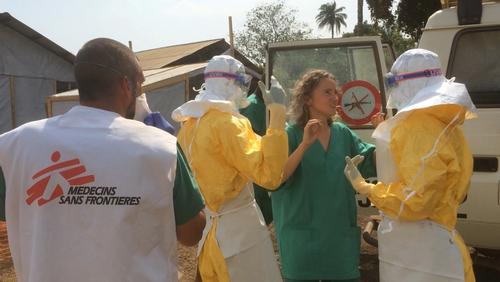Conakry / Brussels / Geneva, 31 March 2014 – With eight confirmed cases of Ebola reported in the capital Conakry, Médecins Sans Frontières (MSF) is facing an unprecedented epidemic in terms of the distribution of cases now scattered in several locations in Guinea.
“We are facing an epidemic of a magnitude never before seen in terms of the distribution of cases in the country: Gueckedou, Macenta Kissidougou, Nzerekore, and now Conakry,” said Mariano Lugli, coordinator of MSF's project in Conakry.
Sixty international staff on the ground
MSF continues to strengthen its teams. By the end of the week, there will be around sixty international field workers who have experience in working on haemorrhagic fever divided between Conakry and south-east of the country.
Among the field workers are doctors, nurses, epidemiologists, water and sanitation experts as well as anthropologists. In addition, more than 40 tons of equipment have been flown into the country to try to curb the spread of the disease.
“MSF has intervened in almost all reported Ebola outbreaks in recent years, but they were much more geographically contained and involved more remote locations. This geographical spread is worrisome because it will greatly complicate the tasks of the organisations working to control the epidemic,” said Lugli.
Isolation the only way to break chain of tranmission
In Conakry, MSF has strengthened the support for the isolation of patients located at the referral hospital of Donka, in collaboration with the Guinean health authorities and the World Health Organization (WHO). Other patients in other health structures are still hospitalised in non-optimal conditions and isolation must be reinforced in the coming days.
The teams are also looking for a suitable place to set up a new structure to further support local health authorities. At the same time, MSF has already begun to identify people who may have been in contact with existing patients. The search for potential new patients, and if necessary, their isolation is the only way to break the chain of transmission of the virus. There is currently no vaccine against or treatment for Ebola.
In the last two weeks in the southeast of the country, in the towns of Guekedou and Macenta, MSF rapidly deployed teams and established two structures for the isolation of patients. Raising awareness and identifying new cases is ongoing with the help of the community. In this region, the isolation of patients who have been identified will help control the spread of the virus.
'most aggressive and deadly strain of virus'
“In Guinea, it is the Zaire strain of Ebola virus. This is the most aggressive and deadly. It kills more than 9 out of 10 patients,” said Michel Van Herp, an MSF epidemiologist currently in Guekedou.
“To stop the outbreak, it is important to trace the chain of transmission. All contacts of patients likely to have been contaminated should be monitored and isolated at the first sign of infection.”
To date, Guinean health authorities have recorded 122 suspected patients and 78 deaths. Other cases, suspected or diagnosed, were found in Sierra Leone and Liberia.
“It is important that the Guinean authorities and the WHO help medical facilities put in place all necessary hygiene measures,” said Van Herp.
MSF has worked in Guinea since 2001 on projects supporting the treatment of HIV / AIDS and malaria



